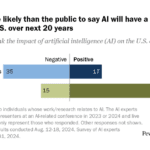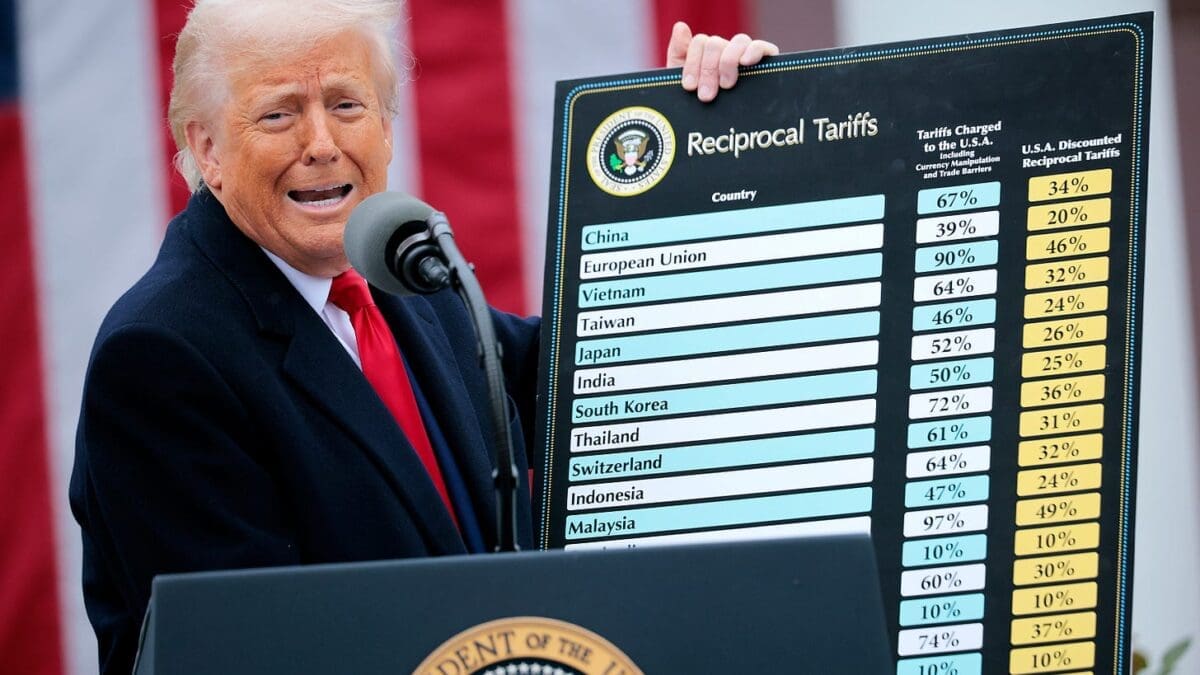
Public Housing Is the Only Cure for Europe’s Housing Crisis
April 3, 2025
Appendix B: Selected tables by expert and public demographics
April 3, 2025Guess we’re really doing this, huh? Happy Thursday.
by Andrew Egger
Have you ever seen a presidential economic address crash the economy in real time? Before yesterday, I hadn’t.
Donald Trump’s “Liberation Day” speech, announcing mammoth new tariffs on pretty much everybody, sent markets into freefall around the world. CNBC’s Jon Fortt summed up the instantaneous response on air yesterday: “The market reaction after hours, I’ve never seen anything like it. This—I think, fair to say—is worse than the worst-case scenario of the tariffs that many in the market expected the president to impose.”
I’m sorry: Have the markets met this guy?
Trump has few deeply held policy commitments, but on trade and tariffs he’s been consistent all along. He has two lodestar beliefs. First, tariffs are a positive good that enrich a country at the expense of its neighbors with no internal trade-offs. Second, trade deficits are inherently bad: If your country is buying more goods from another country than they’re buying from you, you’re losing.
Markets have tended to brush aside these beliefs, which Trump expresses all the time in public, because they’re insane fantasies that, if pursued in policy, would crash the U.S. economy. After all, Trump talked this way all through his first term, but his actual policies fell short of his rhetoric: The protectionist actions he did take may have crimped things here and there, but they were ultimately not large enough to throttle otherwise strong U.S. and global growth.
But new year, new Trump admin, baby! Gone are those RINO cucks who used to talk Trump out of the big, bold policy swings he really wanted to take. Trump’s new trade course is different, as investors are now realizing to their horror. It isn’t just the biggest U.S. tariff hike in more than a century. It’s an attempt to build a new trade regime on the bedrock of his two basic policy fantasies.
Trump’s flacks have billed the tariffs announced yesterday as “reciprocal,” suggesting they’re pegged to the tariffs and other trade barriers each country is already imposing on the United States. This is ultimately a political argument: People otherwise skeptical of tariffs might sympathize with the notion that we’re only doing to others what they’re already doing to us.
But as many pointed out immediately after the rates were announced, that’s not actually where the White House got its numbers. Instead, the rates were based on a simple formula: our trade deficit with a country divided by the amount we import from that country, all divided by two. The bigger our trade deficit with a country, the higher the tariff rate. Bizarrely, the White House insisted it had not done this—while releasing equations showing that’s precisely what they had done. If you’ve got a head for math, you can see for yourself. (What was that I was saying yesterday about these liars?)
The current economy is constituted around a different set of assumptions, like that Americans want to be able to buy $5 T-shirts but find the idea of working in factories producing $5 T-shirts unpleasant, or that we are happy to be able to buy and drink coffee from equatorial countries whether or not equatorial countries buy equivalent quantities of goods from us. These are the sorts of realities the White House seems determined to stamp out.
The numbers may be totally made up, but the barriers the administration is slamming in place will be very real. Consumer prices on pretty much anything manufactured abroad—or manufactured with parts made abroad—will soar quickly. Businesses organized around imports will feel the immediate squeeze. U.S. exporters are all but guaranteed to be harmed as well—not only by rising costs on their own imported inputs, but by actually reciprocal tariffs we’re likely to see from other countries in response. And all this will create the sort of economic chaos and upheaval that destroys market efficiency, vaporizing trillions in value to the benefit of literally nobody.
Where does it stop? Nobody knows! At any point in time, Trump could choose to slam the brakes. Markets pointing straight down tend to stress him out. But he’s also riding with his id in a way he’s never been able to before, and his id continues to whisper that “tariffs = prosperity.” The Great Depression, he said yesterday, “would never have happened if they had stayed with the tariff policy.”
by William Kristol
Yesterday, Donald Trump proudly boasted, was Liberation Day.
Liberation from what? From free trade. And from an international economic system of which free trade—or at least freer trade—has been a key part. This is the system that Trump denounces as having “ripped off” and “looted” America for the past half century. And so he seeks to overturn it.
But the fact is that the post-1945 international economic system produced by far the greatest increase of global prosperity and human well-being in history. Hundreds of millions of Americans, and billions of people around the world, have benefitted in fundamental ways from this system—in terms not just of unparalleled wealth and health, but in the opportunity to live better lives.
For this international economic system was more than merely an economic system. It was a crucial part of an international political system that, over the last 80 years, produced less war and more peace, less conflict and more cooperation, less hatred and more progress, less dictatorship and more political freedom.
The defenders of free trade have always understood that the case for it went beyond narrow economics. As President Reagan said in 1985:
Our trade policy rests firmly on the foundation of free and open markets—free trade. I . . . recognize the inescapable conclusion that all of history has taught: The freer the flow of world trade, the stronger the tides of human progress and peace among nations.
In saying this, Reagan was echoing one of his political heroes, Winston Churchill.
Churchill crossed the aisle from the Conservatives to the Liberals in 1904 over the issue of free trade. In his great speech at the Free Trade Hall in Manchester in February of that year, Churchill warned that protection would not work and explained that tariffs are a tax.
It is the theory of the Protectionist that imports are an evil. He thinks that if you shut out the foreign imported manufactured goods you will make these goods yourselves, in addition to the goods which you make now, including those goods which we make to exchange for the foreign goods that come in. If a man can believe that he can believe anything. We Free-traders say it is not true. To think you can make a man richer by putting on a tax is like a man thinking that he can stand in a bucket and lift himself up by the handle.
But Churchill also wanted to emphasize that the case for free trade is part of a broader case for political liberty and national well-being.
Here we are, in the dawn of the twentieth century, in spite of the drain of a costly war [the Boer War], in spite of our easy-going methods, in spite of the profuse and profligate expenditure, in spite of the luxury of our wealthy classes, here we are in the dawn of the twentieth century not inferior in wealth, power, contentment, and in fame to any nation on the face of the globe.
And Churchill closed his speech with a defense of the early nineteenth-century proponents of free trade and economic liberty, the leaders of the Manchester School, Richard Cobden and John Bright:
But what is the conclusion to which these reflections lead us? . . . It is the fashion nowadays to sneer at the Manchester school . . . But I dare say there are some people tonight who will think that it is about time that the philanthropic, peaceful, progressive, socialising doctrines which were prescribed by Mr. Cobden and Mr. Bright were a little more considered by the statesmen who govern our land. No one will pretend that these doctrines were a complete revelation of human policy; but it was Mr. Cobden’s work to lay a great and valuable stone in the long stairway of human achievement.
Liberalism represents a great stone in the long stairway of human achievement. Free trade is an important part of that achievement. It’s an achievement worth defending against the retrograde and destructive efforts of Donald Trump.
-
Trump’s War on the Universities… The administration’s power grab is no solution to the real problems on campus, writes CATHY YOUNG.
-
Abandoned in a Foreign War Zone… NANCY CLAIR reports on one USAID employee’s experience in Kinshasa as the agency was dismantled.
-
Stop Groping Greenland… Trump’s predatory treatment of Greenland and Denmark is psychosexually sick, WILL SALETAN argues.
-
Elon’s Worst Day Ever: BEN PARKER and ANDREW EGGER chat about the embarrassing loss for Republicans in Wisconsin, his rumored impending exit from the the White House, and clear messages from Tesla stocks.
I KNOW WHEN I’M NOT WANTED: Chaos looms in the next New York City mayoral election, where incumbent Eric Adams just announced he’s peacing out of the Democratic primary to run as an independent. Politico reports:
In an interview Monday, Adams said he would “mount a real independent campaign” that relies on “a solid base of people” outside Manhattan, with an emphasis on ethnic minorities who boosted him to victory four years ago. He lamented how the bribery charges federal prosecutors hit him with in September—which a judge dismissed Wednesday—“handcuffed” him, and he promised to be “uninhibited” on the campaign trail.
It’s not a totally surprising move: Adams has seen his popularity with Democrats fall off a cliff, an understandable reaction to his quid-pro-quo embrace of the Trump administration following the Justice Department’s decision to drop the charges against him. His exit from the primary leaves it a likely mano-a-mano battle between former Gov. Andrew Cuomo and state Rep. Zohran Mamdani, a member of the Democratic Socialists of America.
TUFTS SPEAKS OUT: A dismaying number of U.S. institutions have quietly kept their heads down while the Trump administration has rampaged through their neighborhoods, believing that the easiest way to provoke the lawless and retributive government is to protest. Tufts University is not among these institutions. The school filed a court declaration yesterday calling for the immediate release of Rumeysa Öztürk, the Turkish Tufts grad student whom plain-clothes masked officers grabbed off the street last week after the administration vaporized her student visa over a student-paper op-ed she co-authored last year.
The university’s declaration called Öztürk a student “in good standing” and said it had “no information to support the allegations that she was engaged in activities at Tufts that warrant her arrest and detention.” The declaration also reported that the action had rattled other Tufts students, who were now “forgoing opportunities to speak at international conferences and avoiding or postponing international travel. In the worst cases, many report being fearful of leaving their homes, even to attend and teach classes on campus.”
Where we’re at:
Great Job William Kristol & the Team @ The Bulwark Source link for sharing this story.








